For today’s comparison, I have decided to confront two very popular air purifiers, which have achieved a respectful reputation on the market, mainly thanks to outstanding performances and reliability.
As you can see for yourself, there is an evident size difference, which brings us to many conclusions, one of which is the room coverage. In the case of Blueair 211+, we have a capable air purifier that covers up to 540 sq. ft., whose massive motor can purify all that space with no trouble.
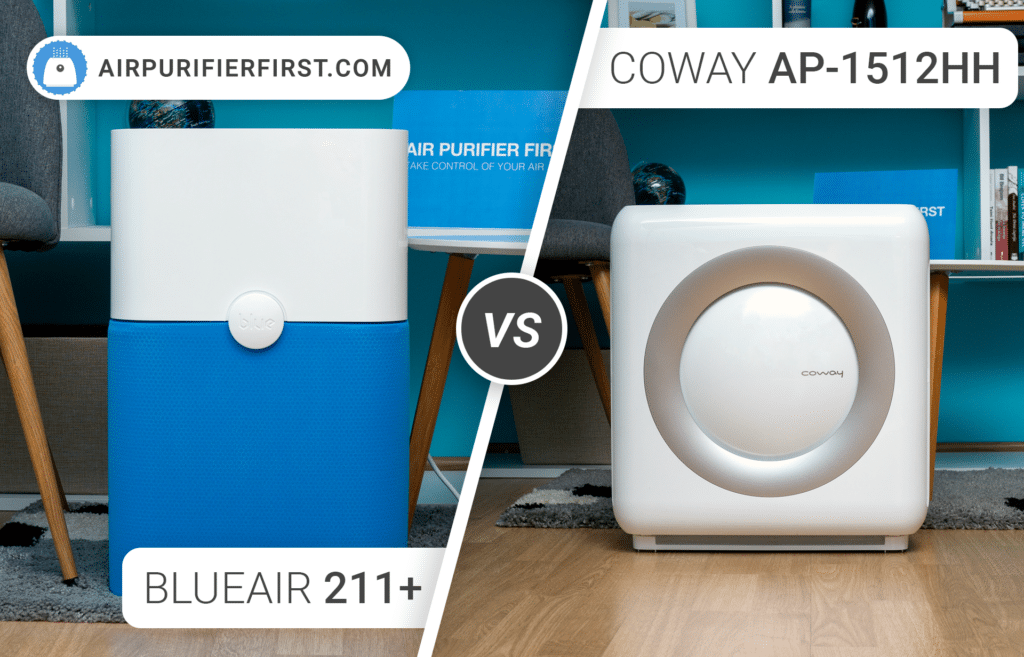
Table of Contents
One of the advantages that come with ownership of this air purifier is the visual part of its identity. The plain white color covers the entire appliance, but the innovative segment is the pre-filter, which can be found in various colors. So, not only did the producers want to create a great air purifier but also to make it eye-catching.
As opposed to the Blueair, Coway AP-15122HH comes in a plain white or black color and a little bit old-fashioned look. But don’t worry, it will easily fit into any interior, especially the minimalistic one. The producers promise it can stand up against 361 sq. ft. of your work or living space.
I was not blown away by the quality of material each of these air purifiers is made of, but I would lie if I said that it disappointed me.
One of the main distinctions between the two devices is the features each one is supplied with. While Coway Mighty has plenty of advanced features, Blueair 211+ is a totally minimalistic appliance with almost no advanced features to brag about.
Do you want to know more about their performances and reliability? Or, you want to know which one is quieter? I will answer all of your questions in the upcoming lines.
Specs: Blueair 211+ Vs Coway AP-1512HH
| Product Image | 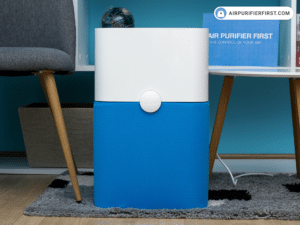 | 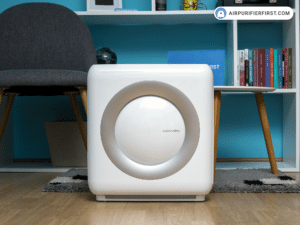 |
| Manufacturer | Blueair | Coway |
| Model | 211+ | AP-1512HH |
| Dimensions (inches / cm) | 20.5 x 13 x 13 inches (52.2 x 33 x 33 cm) | 16.81 x 9.65 x 18.30 inches (42.7 x 24.5 x 46.5 cm) |
| Weight (pounds / kg) | 15 lb (7 kg) | 12.8 lb (5.8 kg) |
| Clean Air Delivery Rate (CADR) | 350 CFM (595 m³/h) | 233 CFM (396 m³/h) |
| Coverage (4.8 ACH)
Room Coverage Explanation: ACH is a measurement used in indoor air quality management to indicate how many times the air within a defined space is changed/moved through the filter media.
For more details, visit our ACH calculator tool. | 540 sq. ft. (50 m²) | 361 sq. ft. (33 m²) |
| Performance Ratings Performance Ratings Score Summary: 8.6 - Average Score (67 products) 9.8 - Best Score (2 products) 2.5 - Worst Score (1 products) We use the Temtop LKC-1000S laser particle meter to test the particle removal efficiency of every air purifier. It measures PM2.5 (µg/m3), PM10 (µg/m3), Particles (per/L), and HCHO (mg/m3) in the air, and also calculates the AQI. You can read more about our testing methodology here. | ||
| Filtration Technology | Washable Pre-filter, Particle Filter, Carbon Filter, and HEPASilent | Pre-filter, Deodorization Filter, True HEPA Filter, and Ionizer |
| Filter Replacement Indicator | Yes | Yes |
| Filter Life | 6 months | up to 12 months |
| Power Consumption
Power Usage Summary: Our extensive testing of 67 air purifiers revealed the following power consumption insights:
Check out our power consumption calculator tool. | 61W | 77W |
| Operating Costs Ratings Operating Costs Ratings Score Summary: 9.1 - Average Score (67 products) 10 - Best Score (2 products) 8 - Worst Score (1 products) We measure the power usage at all speeds using an energy meter, after which we calculate how much it would cost to use the device at a particular fan speed for one month. For reference, we use an energy price of $0.12 per kWh. You can read more about our testing methodology here. | ||
| Number of Fan Speeds | 3 – Speed 1 (Low), Speed 2 (Medium), and Speed 3 (High) | 3 – Speed 1, Speed 2, and Speed 3 |
| Air Quality Sensor Air Quality Sensor Summary: Out of 67 air purifiers tested, only 31 have the air quality sensor. | No | Yes |
| Air Quality Indicator | No | Yes |
| Auto Mode Auto Mode Summary: Out of 67 air purifiers tested, only 32 have auto mode functionality. | No | Yes |
| Smart App Smart App Summary: Out of 67 air purifiers tested, only 20 have smart app functionality. | No | No |
| Voice Control Voice Control Summary: Out of 67 air purifiers tested, only 20 have voice control functionality. | No | No |
| Other Features | Smart Plug | IonizerTimer |
| Noise Level (low – high) | 43.9 – 59.7 dBA | 41.4 – 63.5 dBA |
| Noise Ratings Noise Ratings Score Summary: 9.3 - Average Score (67 products) 10 - Best Score (1 products) 8.2 - Worst Score (1 products) We use a special noise measurement tool to test the noise level of the air purifier at all speeds. We measured the noise level on the dBA scale. You can read more about our testing methodology here. | ||
| Best Suited For | Living Rooms Offices Allergies Large Spaces Dust | Pets Living Rooms Kitchens Allergies Dust |
| Warranty | 2-year | 3-year |
| In-Depth Review | Blueair 211+ | Coway AP-1512HH |
| Price | Check Price on Amazon | Check Price on Amazon |
Features Overview
Coming from a Blue Pure series, the Blueair 211+ is a minimalistic and easy-to-use air purifier with not as many advanced features as its opponent, the Coway AP-1512HH. Coway Mighty, on the other hand, comes loaded with many features that will make your everyday life much easier.
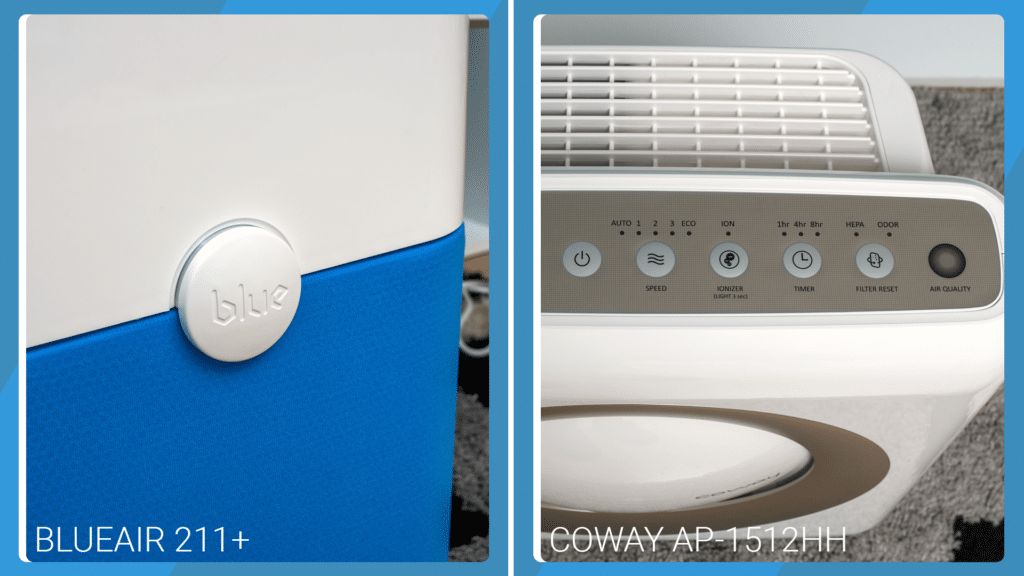
One of the main features in common is the Filter Reset Indicator.
However, one thing works in favor of Blueair 211+, and it’s the smart plug connection. With this option, the Blueair memorizes the last adjusted speed level and, as soon as it gets connected to the power supply, the appliance turns ON.
Air Quality Sensor
The Air Quality Sensor is the option that the Blueair 211+ is missing. Yet, there is a new production series of Blueair purifiers that have this feature integrated. One of them is the proceeder, the Blueair 211+ Auto, which comes with an Air Quality Sensor and the Auto Mode.
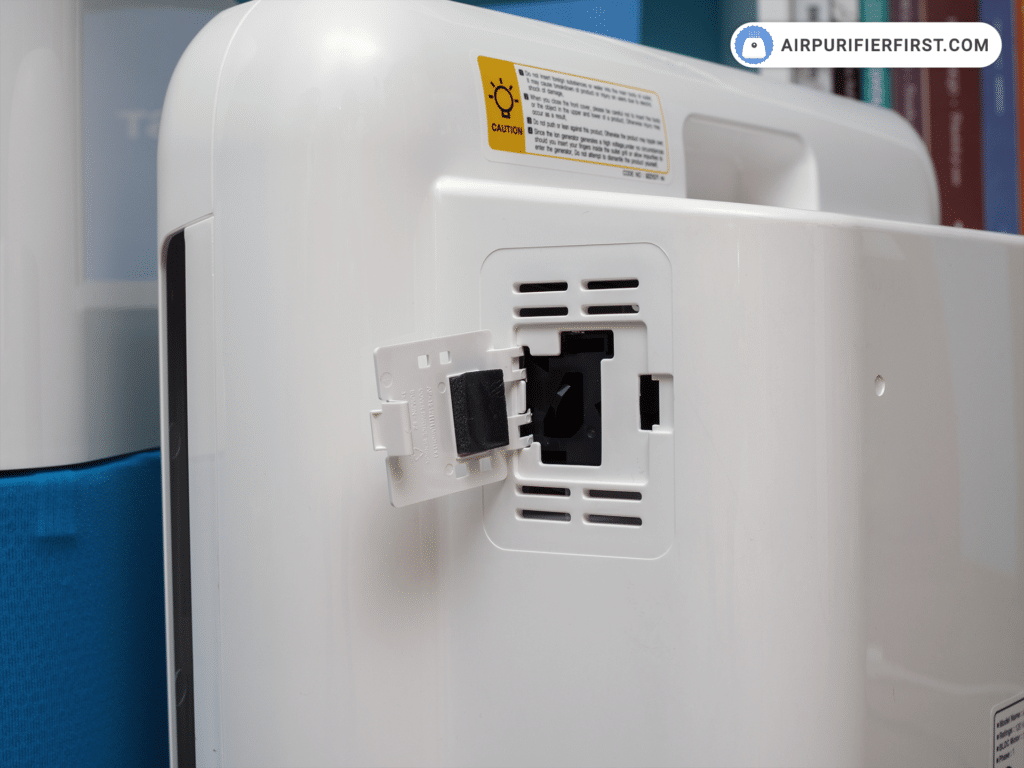
The Coway AP-1512HH comes with a significantly upgraded Air Quality Sensor that communicates the real-time indoor particles.
You can find it in the form of an LED indicator placed on the left side of the Control Panel. Depending on the air quality it measures at the moment, it will switch the colors from blue to violet to red. This is how you get assured of its reliability. What I really liked is that you can adjust the level of sensor sensitivity, and you can adjust it in three levels. That way, you can easily adapt the appliance according to your needs, plus combine it with many other features.
Auto and ECO Modes
Another mode that Blueair is missing is Auto Mode, while on the other side, Coway AP-1512HH has both Auto and ECO Mode. Both modes operate while communicating with the Air Quality Sensor.
Once the air purifier is shifted to Auto Mode, the motor will switch between the gears, depending on the air quality measured by the Sensor. That way, the motor adjusts to achieve the best efficiency possible.
The ECO mode runs on a similar basis. If you set the air purifier on this mode, and the air quality remains excellent for at least thirty minutes, it will switch into standby mode. The second the air shows signs of pollution, the air purifier is back ON, again in ECO mode, until the quality of the air is improved.
Filter Reset Indicator
Like I previously said, both air purifiers have the Filter Reset Indicator. This feature is of relevance because it takes part of your responsibility, which would be checking up on the time of filter replacement. Since that time differs for Blueair 211+ as opposed to Coway Mighty, this indicator has diverse ways of functioning for each air purifier.
Blueair 211+ has the Filter Reset Indicator placed along with the Control Button. This indicator lights up in different colors, depending on what it needs to warn you about. A yellow color means you still have around a month or so before filters need a complete replacement. The red color of the Indicator, on the other hand, means that the filters have given their best and that you should replace them as soon as possible.
In the case of Coway Mighty, there is a slightly different replacement procedure. This air purifier has two Filter Reset Indicators, one for the True HEPA filter and the other for the Carbon filter. Since both filters have separate replacement intervals, each indicator lights up at individual times.
Ionizer
Coway Mighty has the Ionizer as the fourth stage of filtration. Still, I really liked that you don’t have to use this option if you don’t want to. It’s your choice whether you turn it ON or leave it OFF. On the other hand, the Blueair 211+ has a built-in HEPASilent technology that cannot be turned off and remains active.
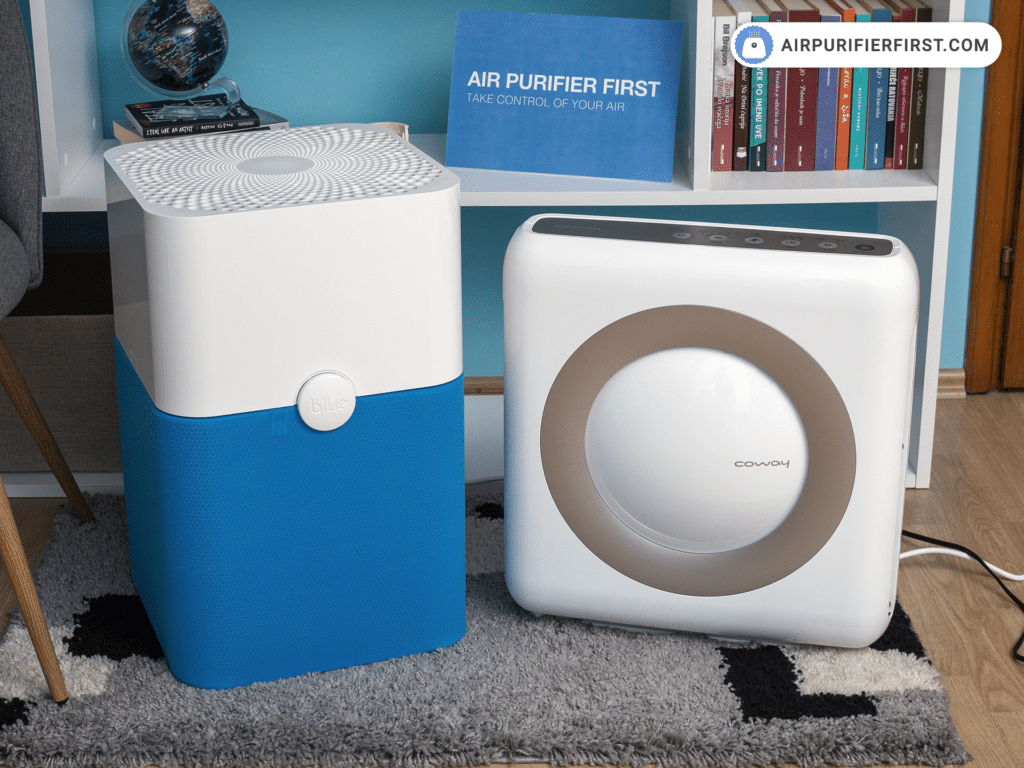
The most important thing I have to point out is that both air purifiers are CARB-certified. It means not one of them produces illicit ozone quantities.
Timer
The Blueair 211+ doesn’t have this option preinstalled. But, if you connect it to a smart plug, you can provide your air purifier with this feature.
The Coway AP-1512HH has this feature, and it lets the user set the time during which the air purifier will run. You can adjust the Timer to 1h, 4h, or 8h of continuous motor running.
Airflow
Due to their shapes and different structures, the airflow these appliances provide differs a lot. Since Coway Mighty has a frontal lid, the suction holes are placed below and once the air is filtered, it comes out through the bars on the upper side of the appliance.
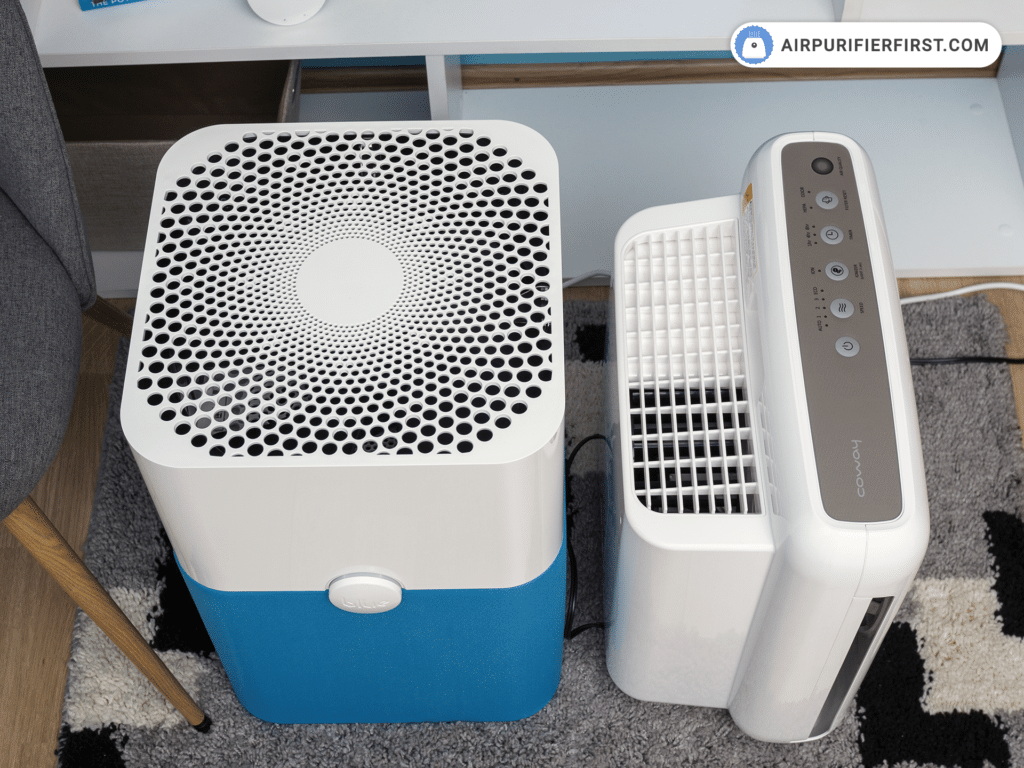
Blueair is not as limited as Coway is. The suction holes are dispersed all around the air purifier, right under the filter. Once the air is filtered, it gets distributed all over the room through the upperside openings.
Warranty
While Blueair 211+ comes with a 2-year warranty, Coway Mighty has turned out to be more generous by giving the user a 3-year warranty coverage. Despite this, I would still recommend you to register on the producers’ websites right after you buy the appliance, just to make sure you got it all confirmed and covered.
Filtration Technology
In one of the previous sections, I mentioned the Ionizer and the HEPASilent technology as the fourth stages in Coway Mighty and Blueair air purifiers accordingly. While the Ionizer is arbitrary, the HEPASilent technology isn’t. Still, there are three basic stages of filtration for both air purifiers.
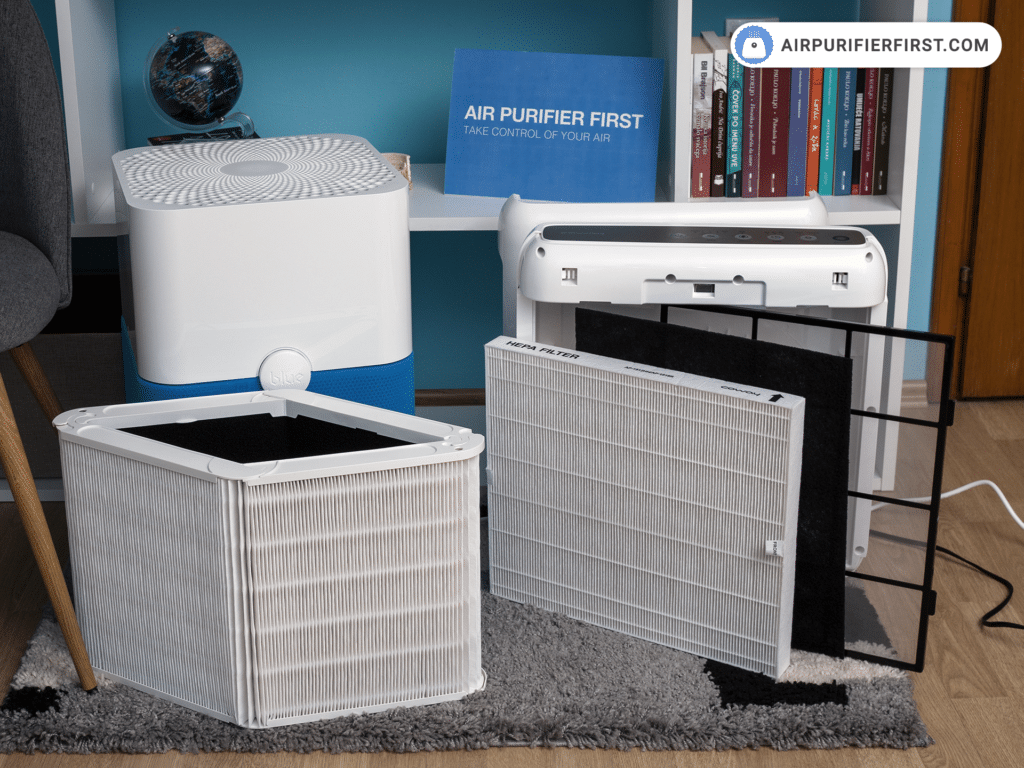
The first filtration stage for both air purifiers is a washable pre-filter. These filters are so easy to maintain. All you have to do is keep them clean and wash them at least once a month. That way, you will never have to replace it with another one. The Coway Mighty has its filter in the form of a metal net that looks like the mosquito net you put on your windows. The Blueair 211+ has a pre-filter in the form of a fabric that can be pulled on or taken off of the air purifier. You can do it in order to wash it or to swap it for a different colored pre-filter.
As the second filtration stage, Coway has installed a fibrous carbon filter. This filter did not turn out to be as satisfying as I expected since it failed in odor neutralization. Blueair 211+ has a particle filter installed, which has about the same purpose as the True HEPA filter but is much less efficient and powerful.
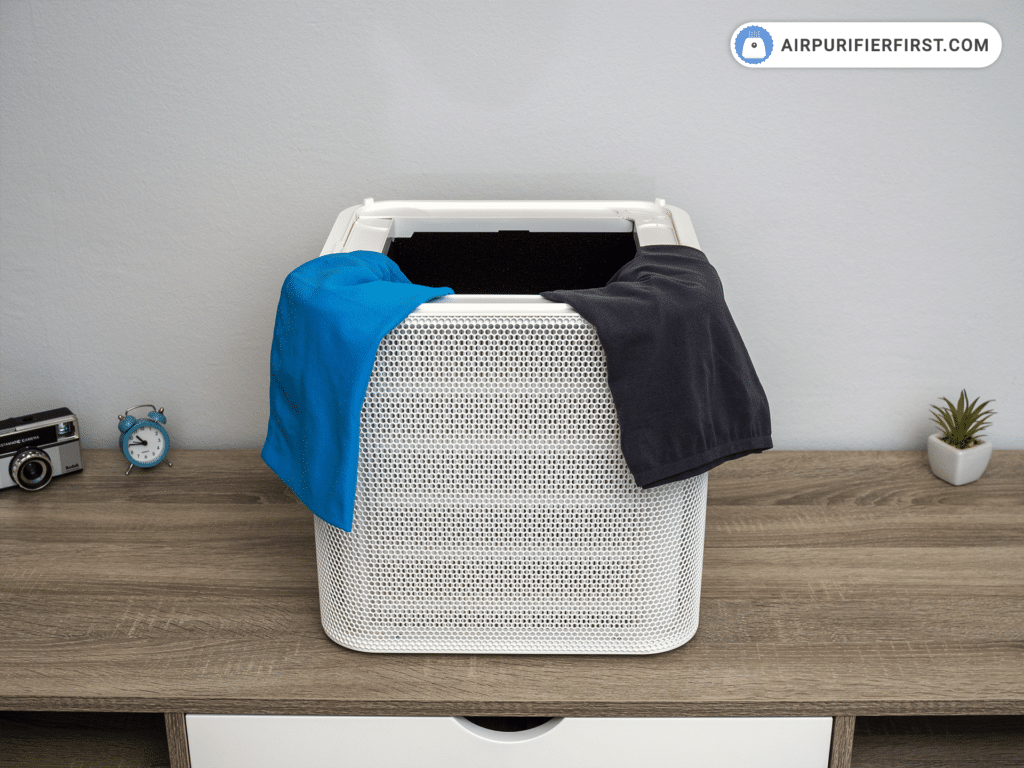
Now that I mentioned the True HEPA filter, I must add that this filter takes the third position in Coway’s filtration system. This filter is the one to ‘’blame’’ for all the good performances Coway Mighty has shown. As for Blueair’s third stage of filtration, it is reserved for the fibrous carbon filter. Same as Coway’s filter, this one won’t help you much in neutralizing the odors from your kitchen or living room.
As I previously said, both air purifiers also have the additional fourth stage of filtration. Coway Mighty has the Ionizer, while Blueair 211+ has the HEPASilent Technology.
In each case, all the filters that are integrated are of good quality, which results in outstanding performances in both air purifiers.
How To Replace Filter On Both These Devices?
To begin with, with pre-filters, which are washable in both cases, you have one less worry. That is if you keep it clean regularly. While Blueair 211+ needs to change its filters twice a year, Coway Mighty has to do it three times for the carbon filter and once a year for the True HEPA filter.
However, no need to keep the score; you’ll have the Filter Reset Indicator to do it for you. As you are already familiar with, this indicator serves to warn you of the filter replacement in due time. As soon as it enlightens, you should replace the filters as soon as possible.
Just to keep up with good service, your favorite air purifier needs proper maintenance. So don’t be lazy, and give it a decent wiping or vacuum session once in a while, and your lungs will be grateful, as well as your little helper.
Noise Test
There are three fan speeds in both Coway AP-1512HH and Blueair 211+, and no Sleep Mode whatsoever. I have to say that, in terms of the noise they produce, both air purifiers have about the same outcomes.
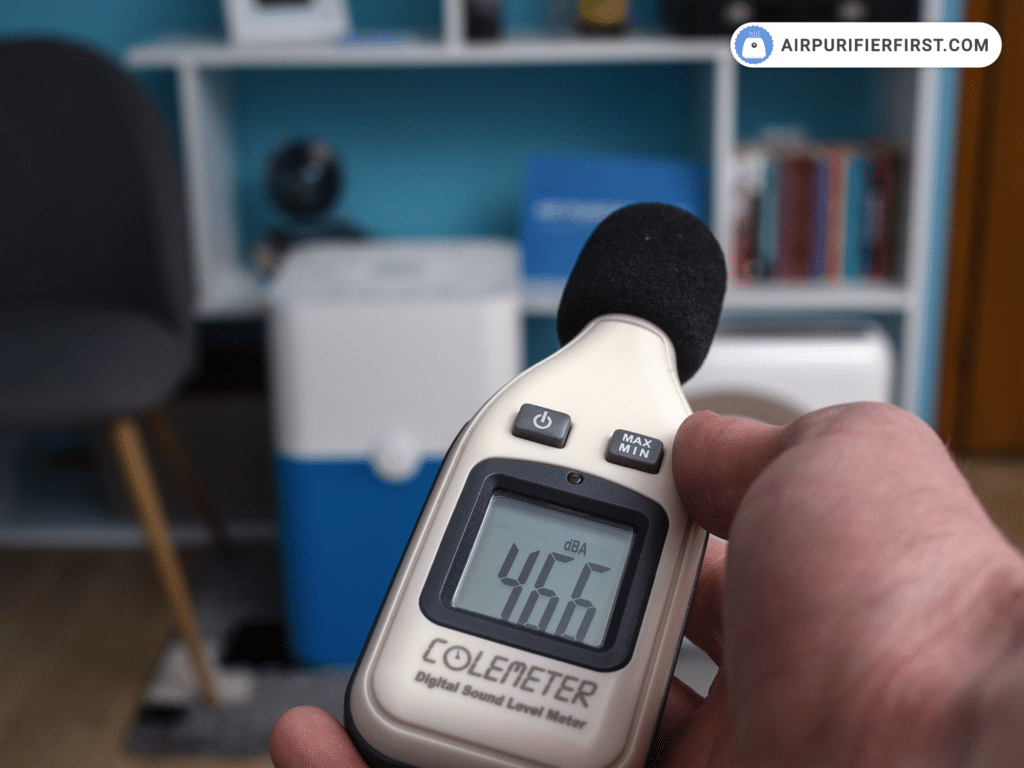
The first two speeds make the motor run smoothly and pleasantly. Meanwhile, while working at top speed, the noise is so annoying, making it almost impossible to stay in the same room with the air purifier. It is important to know, plus recommended that you don’t always have to turn the air purifier to maximum speed level. Only when you notice or are aware of highly polluted air in your living space is when you set the air purifier to top speed level.
| Product | Noise Range (dBA) |
|---|---|
| Blueair 211+ | 43.9 – 59.7 dBA |
| Coway AP-1512HH | 41.4 – 63.5 dBA |
Still, I have to point out that Coway Mighty is a bit more silent while on first speed, contrary to Blueair 211+. This could be of relevance if you’re planning to place the appliance in your bedroom, so keep that in mind.
Performance Tests
There is one thing you have to keep in mind while deciding which air purifier to choose. Both Blueair 211+ and Coway AP-1512HH are large air purifiers designed for larger rooms. While Coway can cover up to 361 sq. ft., Blueair 211+ covers even larger, 540 sq. ft. room size.
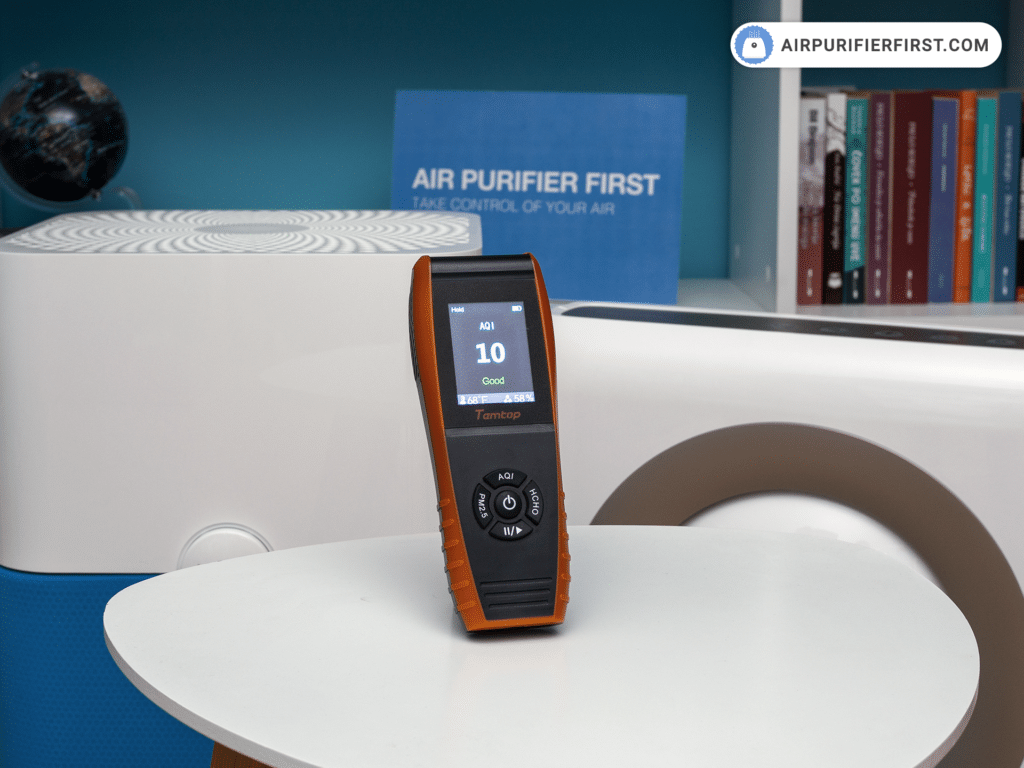
For this reason, I have chosen the 320 sq. ft. room as the most optimal size for this comparison. In addition to this test, I have run some others as well. So, if you want to know more about it, feel free to check out my website. There are some pretty interesting reviews waiting for you.
For this comparison, I give a minor advantage to Coway Mighty due to its True HEPA filter, which is proven to be the best for achieving great performance. Still, both air purifiers have turned out to be great in tests I made, so their overall performance is more than jaw-dropping.
320 sq. ft. Room Tests
To be sure of the results I would get, I had both Blueair 211+ and Coway Mighty tested in the same conditions. Starting with the same room size, that was 320 sq. ft., and leaving it for sixty minutes at top speed level, both devices have blown me away.
The indoor air quality was highly improved, up to 96%. If that’s not a great result, I don’t know what is. This only proves that producers have made the right call when investing in the good performance of each air purifier.
320 sq. ft. Room
* Data measuring time is 60 minutes.
What I do have to report is the inadequate odor neutralization in both cases. It seems as though the fibrous carbon filter does not adsorb enough carbon, which causes this purifier’s failure.
However, these are both powerful appliances, each in its category and worth being a part of one serious comparison.
Operating Costs
The interesting part of this comparison is that, even with a weaker 61W motor, Blueair 211+ turns out to be less of a power consumer than Coway Mighty with its 77W motor.
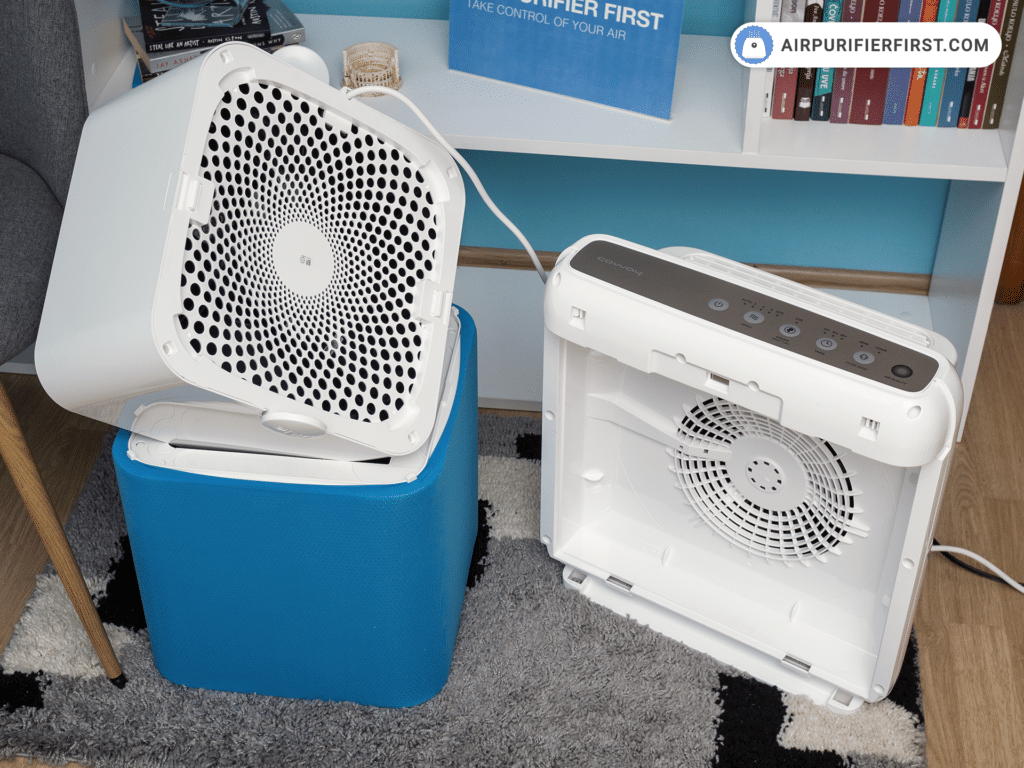
If you decide to leave any of these air purifiers working full-time at top speed for a month, you will end up with a $6 bill to pay for Coway Mighty and $4.3 for Blueair 211+.
| Product | Wattage Range (W) |
|---|---|
| Blueair 211+ | 0.2 – 49W |
| Coway AP-1512HH | 0.2 – 69.1W |
Even though Blueair won’t drain too much energy, its filters are more expensive and need to be replaced more than Coway’s. With this in mind, Coway Mighty turns out to be the cheaper solution in this comparison annually.
Coway AP-1512HH Vs Blueair 211+ – Video Comparison
Which One Does It Better?
Despite the fact that Blueair 211+ is a larger air purifier, with better airflow, I have to declare the Coway AP-1512HH as the winner of this comparison. There are plenty of reasons why, so I’ll mention just a few. Having lower maintenance costs, a lot more advanced options, a True HEPA filter, and being less noisy on level one, are just some of the reasons why this air purifier is a better option.
Nonetheless, if you are planning to use the air purifier in a room size that is larger than 361 sq. ft., go ahead and buy a Blueair 211+. For sure, this air purifier won’t let you down.
There are probably some other questions that are left unanswered, so please write them down in the comments section, and I will be more than pleased to answer all of them.
Leave a Reply